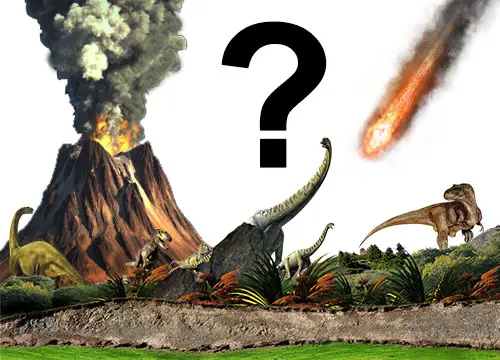What killed the dinosaurs ?

As a paleontologist, one of the most intriguing and often-asked questions I encounter is, “What killed the dinosaurs?” The extinction of the dinosaurs, which occurred about 66 million years ago, is undoubtedly one of the most significant events in Earth’s history. The extinction of these giant reptiles opened the way for the evolution and diversification of mammals and birds, ultimately leading to the world we know today. In this blog post, we will explore the most widely accepted theories on what caused the extinction of the dinosaurs.
The Chicxulub Impact:
The most popular and widely accepted theory regarding the extinction of the dinosaurs is that a massive asteroid or comet collided with the Earth. This impact was so significant that it triggered a chain reaction of events that led to the demise of the dinosaurs. This asteroid, known as the Chicxulub impactor, was estimated to be about 10 to 15 kilometers wide and impacted the Yucatan Peninsula in Mexico.
The impact caused a massive explosion, triggering a vast shockwave that caused earthquakes and volcanic eruptions. The impact also released a vast amount of dust and debris into the atmosphere, which blocked out the sun’s light and caused a global cooling effect. This drop in temperature and light levels would have caused significant environmental changes and disrupted food chains, leading to the extinction of the dinosaurs.
Volcanic Activity:
Another theory regarding the extinction of the dinosaurs is that massive volcanic eruptions played a significant role. During the late Cretaceous period, the Deccan Traps in what is now India erupted. These eruptions are believed to have released a vast amount of carbon dioxide and other greenhouse gases into the atmosphere, causing global warming.
The increased temperature caused by the volcanic activity would have caused changes in the Earth’s climate and disrupted ecosystems. This theory suggests that the combination of volcanic activity and other factors, such as changes in sea level and tectonic activity, would have contributed to the extinction of the dinosaurs.
Disease and Climate Change:
While the Chicxulub impact and volcanic activity are the most widely accepted theories, there are other possible causes of the dinosaurs’ extinction. Some researchers suggest that disease played a role in the extinction of the dinosaurs. This theory suggests that a pathogen, such as a virus or bacteria, may have spread through dinosaur populations, causing mass die-offs.
Climate change may have also contributed to the extinction of the dinosaurs. During the late Cretaceous period, the Earth’s climate was changing, and sea levels were rising. These changes may have disrupted the food chains and habitats of the dinosaurs, leading to their extinction.
In conclusion, while the exact cause of the dinosaurs’ extinction may never be known for sure, the most widely accepted theories suggest that a combination of factors played a role. The Chicxulub impact, massive volcanic eruptions, disease, and climate change are all possible causes of the extinction. What is clear, however, is that the extinction of the dinosaurs opened the way for the evolution and diversification of new life forms, ultimately leading to the world we know today.
